2018 National Export Council Meeting Report
The California Chamber of Commerce recently joined nearly 125 trade specialists from across the nation for sessions focused on trade issues at the National Association of District Export Councils (NADEC) annual two-day event in Washington, D.C. The CalChamber was proud to be a Bronze Sponsor of the NADEC’s annual events this year.
Susanne T. Stirling, CalChamber vice president of international affairs, was among participants at the October 2–3 events, held and presented by the U.S. Chamber of Commerce together with the NADEC. Stirling serves on the Northern California DEC, the steering committee of the NADEC, and the International Policy Committee of the U.S. Chamber of Commerce.
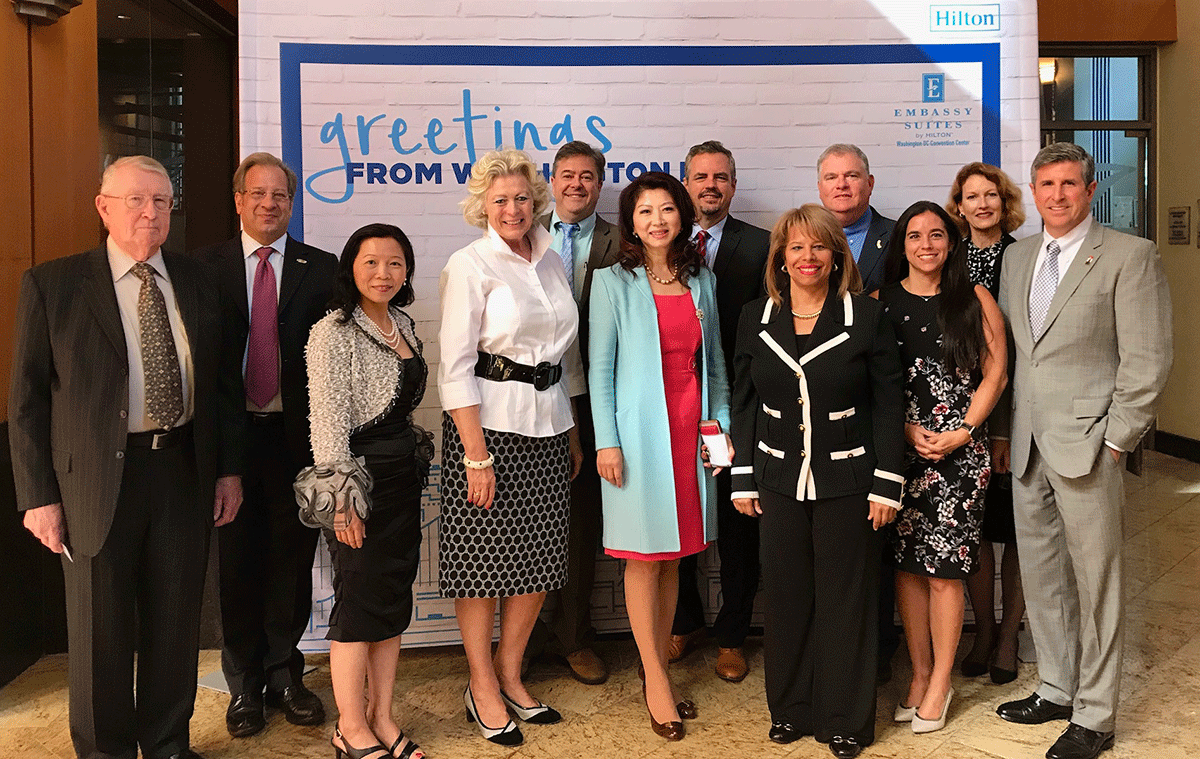
The NADEC is made up of the 60 regional district export councils. The more than 1,500 DEC members around the country all are appointed by the Secretary of the U.S. Department of Commerce. The mission of the DECs is to work with the Commerce Department on export promotion and commercial diplomacy.
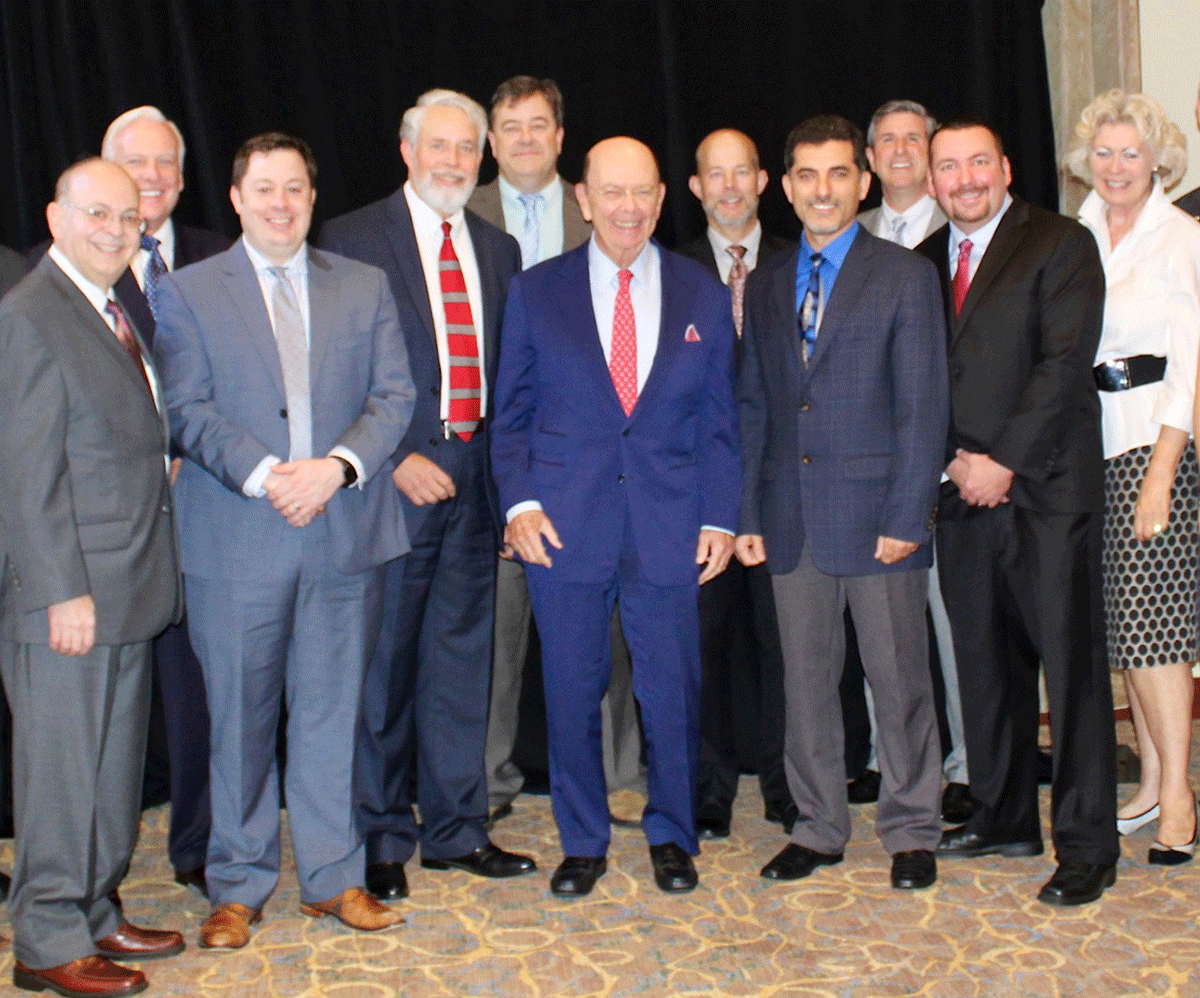
National Association of District Export Councils Annual Export Symposium
U.S. Department of Commerce Secretary Ross and newly announced 2019 National DEC Chair Oz Erdem.
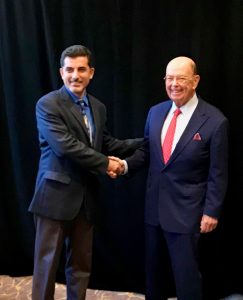
The NADEC Annual Export Symposium was opened on Wednesday, October 3 by Robert Brown, the outgoing National DEC Chair. Oz Erdem is the newly announced chair-elect for the 2018–19 term, as Brown has completed his two terms.
NAFTA Panel
The opening panel focused on the North American Free Trade Agreement (NAFTA) and “What’s on the Horizon.” Conversation surrounded perspectives on what a renegotiated NAFTA means for small and medium-sized enterprises, Fortune 500 companies, and communities across the nation. The panel was moderated by Richard Grana, co-chair of the NADEC Trade Policy Committee. The panel was made up of: Brad Wood, senior advisor for economic and trade policy, Embassy of Canada in Washington, D.C.; Guillermo Malpica Soto, head of the Mexican Trade and NAFTA Office in the Ministry of the Economy, Embassy of Mexico in Washington, D.C.; Karyn Page, chair of Industry Trade Advisory Committee on Non-Ferrous Metals and Building Materials (ITAC 9) and president and CEO of Kansas Global Trade Services; and Shawn Marie Jarosz, immediate past Chair of ITAC 9 and president of TradeMoves LLC.
The timing of the upcoming approval of the U.S.-Mexico-Canada Agreement (USMCA) was discussed. Although the negotiations are completed, there will now be implementation procedures. And although there usually is more discussion about Mexico, there are more members of the U.S. Congress who represent states bordering Canada than Mexico. It is generally agreed that the business community and Congress would not have been supportive of a negotiation that did not include both Mexico and Canada. The USMCA is now considered a better deal, as the process is recognized as open—and the agreement therefore could be updated if needed in the future.
The Mexican official indicated that the government of Mexico did not seek to re-open the NAFTA, but now is pleased that it was. The Mexican goals had been to increase competitiveness, to modernize and update the agreement in financial services, energy and telecommunications, to make the agreement more responsive to small business, and to enhance the certainty of the agreement. The Mexican government also is pleased the timing will allow for the agreement to be signed by the outgoing Mexican President.
It was noted that the current NAFTA is still in effect until the new trilateral 1,800-page agreement is approved by all three countries. The term of the new agreement is 16 years, with an opportunity to start addressing issues after six years.
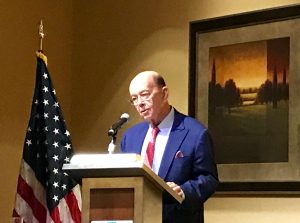
Secretary Ross Keynote
Presenting the keynote address was U.S. Department of Commerce Secretary Wilbur Ross. Secretary Ross thanked the Export Council members and then went on to give an overview of the current U.S. economy and job growth.
The Secretary did recognize some of the economic challenges too, including the need to fill jobs and workforce development. The Secretary then discussed the new U.S.-México-Canada Agreement, saying the old NAFTA is dead and should “rest in peace.” The Secretary indicated all three countries will enjoy better employment as a result of the USMCA. Further, Secretary Ross indicated this should be a boon for e-commerce, in addition to improving market access for U.S. dairy and wheat. There will be better enforcement for intellectual property, and constraints on state-owned enterprises due to a a combination of updating and upgrading the agreement.
The timetable is important. The new Mexican President has indicated he would like his country to approve the agreement before he begins his term on December 1. The Secretary said that U.S. approval would likely come in the spring under Trade Promotion Authority rules. All of this will be completed within the U.S. President’s theme of “free, fair and reciprocal trade.”
This is a rolling 16-year agreement with a six-year review period. The steel and aluminum tariffs will continue separately. The Trump administration has become increasingly vigilant in trade enforcement, but recognizes there are exclusions to this process as well—which are being considered by the U.S. Department of Commerce. Only a small portion of U.S. companies export, so the U.S. Department of Commerce will be unveiling a spring 2019 Initiative to assist this process on-line.
Further, the Trump administration continues to support a full quorum for the Export Import Bank, but in the interim there are other agencies available for exporters, including the World Bank, Inter- American Development Bank and the European Reconstruction Bank. Further, the Trump administration supports the Power Africa Program to assist the continent, and improvement in the procurement laws worldwide.
Doing Business in Russia, Turkey, Cuba
The next panel focused on the topic of “Doing Business Where Others Don’t Dare: Russia, Turkey, Cuba.” The panel, moderated by Wayne Coper of Acron Manufacturing and the North Carolina DEC, included: Randi Levinas, executive vice president and COO of the Russia Business Council; Olga Pina of Shutts & Bowen LLP and the Central-North Florida DEC; and Jennifer Miel, executive director of the U.S.-Turkey Business Council and from the U.S. Chamber. The group discussed the developing trade environment in countries where others might hesitate to engage in business.
In Russia, a key is to stay informed of recent developments in these markets, understand the goals of the government, make personal connections, know who you are dealing with, and recognize this is a long-time market.
The recent increase in tensions with Turkey has had an impact on the business relationship with Turkey. Turkey is at a crossroads geographically. Within four hours of Turkey one can reach 1 trillion people. There is continued high rate of growth in the country, with Turkish Air being a very involved and popular airline for international transactions. Most trading is done with local merchants and via a complex network of local chambers.
Cuba imports 80% of its food. Now looking at a 58-year long embargo, there is a centralized government and economy. The first challenge is following all U.S. regulations, and then being creative with opportunities and future prospects. In Cuba, there still are many in “revolutionary mode.” Food and energy are key sectors of interest for the Cuban economy.
Export-Import Bank
Next, symposium attendees received an update on the ExIm Bank, featuring Natalie McGarry, senior vice president, Office of Congressional and Intergovernmental Affairs with the Export-Import Bank, together with Bill Cummins of the Alabama DEC.
Reauthorization of the ExIm Bank historically has been without hitches, but starting in 2015 the subject became more difficult. Currently without a quorum, the bank is limited to $10 million in transactions. The ExIm President’s slot is still pending on the U.S. Senate floor, and it is hoped there will be a confirmation vote in the very near future, thus making Kimberley Reed the new President and CEO of the ExIm Bank. In addition, before fall 2019, there will be the need for reauthorization of the Export Import Bank once again. Work on educating the members of Congress for a 2019 ExIm Bank reauthorization will be a priority.
Lunchtime Table Topics
During the symposium lunch, assigned tables were divided by topics of interest. Discussions centered around topics: China, Middle East, Africa, Europe, Small Business and Trade Agreements, Western Hemisphere, the IndoPacific; 232/301 Investigations, Enforcement and Compliance, Supply Chain, ExIm Bank, Data Privacy, and Foreign Investment.
China Challenge
Following lunch, the subject switched to the “China Trade Challenge.” A panel was moderated by Jonathan Szucs, general ,manager of advanced superabrasives and communications chair of the NADEC. The panel featured: Alan Turley, deputy assistant secretary for China of the U.S. Commercial Service; Michael Sacharski, former head of China operations for GTE; and Candace Chen, founder of Goddess Cosmetics. The panelists discussed the ground-level impact of tariffs in both the United States and China. The discussion centered on what businesses could be affected the most by tariffs, and the goal of the tariffs.
Indo-Pacific
The last panel of the day focused on the commercial side of the new Indo-Pacific strategy. David Day, a member of the NADEC’s Trade Policy Committee and vice chair of the Hawaii-Pacific DEC, moderated the panel which featured Diane Farrell, deputy assistant secretary of commerce for Asia. She explained the new Indo-Pacific policy and its origins, as well as how the private sector would fit into it. Thirty percent of U.S. exports are in this region with a growing middle class. There now is a big change from the Asia Pacific region to the Indo Pacific region. This is important for security reasons, as trace becomes more globalized.
The focus is not designed to blunt China, but create ways to assist U.S. competitiveness and to send a message that the United States is committed in the region. A multitude of U.S. agencies are involved in this, and there are 22 objectives involving the Cabinet. (https://www.whitehouse.gov/briefings-statements/president-donald-j-trumps-administration-advancing-free-open-indo-pacific/) This is a multiagency program with the U.S. Department Commerce having a large piece of the strategy.
Closing Keynote
The symposium concluded with a second keynote address from Kris Denzel, the new senior director for international policy at the U.S. Chamber, who indicated how positive it is that the USMCA was kept as a trilateral agreement.
National Association of District Export Councils Annual Forum

The Symposium was preceded by the National Association of District Export Councils Annual Forum, which was open to DEC members only.
The NADEC Forum took place on Tuesday, October 2 and was opened by Oz Erdem, the newly elected NADEC Chair.
Tom McGinty, acting assistant secretary for the U.S. Department of Commerce, welcomed about 45 of the 60 DEC representatives from across the United States.
Attending the forum from California were members of the NorCal DEC, the SoCAL DEC, the San Diego DEC, and the Inland Empire DEC. In May 2017, McGinty joined the California DEC meeting held at the CalChamber.
McGinty stated that with a flat budget, the U.S. Department of Commerce is actually losing commercial officers around the field offices. The department has met all its goals, however, and there is a high sense of “customer satisfaction.” Trade barrier removal has been the theme of the department over the last year. There also will be a new export portal online and e-commerce tool kit announced soon.
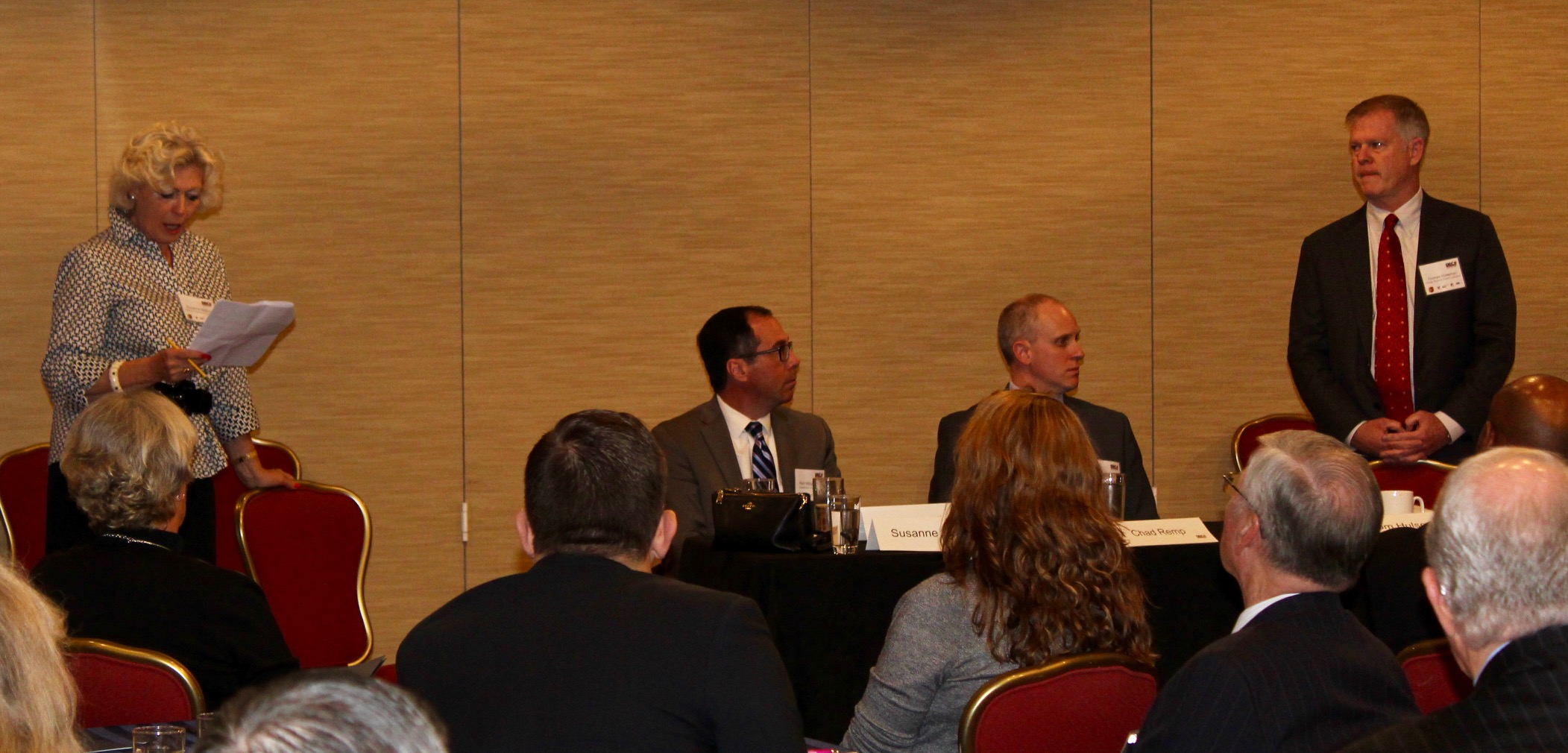
Two panels followed, giving DEC members the option of which to attend. Stirling moderated the first panel on how to get started/re-engage as a DEC member. Panelists were: Ken Mouradian, director of the Orlando U.S. Commercial Service office; Tom Hulseman, managing director of Metro Chicago exports and chair of the Illinois DEC; and Chad Remp, operations manager at Wheeling Truck Center and chair of the West Virginia DEC. Panelists discussed ways to get your DECs motivated, which included gaining new members, upgrading events, and working more closely with the U.S. Department of Commerce and the exporting community.
The second panel at the same time focused on the topic of taking your DEC to the next level. The panel was moderated by Sandy Renner, CEO of FasTrack Global Expansion Solutions Inc. and chair of the Minnesota DEC. Her panelists included Jim Anzalone, president of Compliance Associates from the South Florida DEC, and Elizabeth Hines, business development manager of maritime applied physics and vice chair of the Maryland DEC.
Over lunch, forum attendees heard from Ian Steff, assistant secretary for global markets and director general of the U.S. and Foreign Commercial Service. Steff spoke about the Commerce Department’s goals for free, fair and reciprocal trade and breaking down trade barriers. Steff also discussed the new USMCA, U.S. relations with China, and further details in the area of trade barriers.
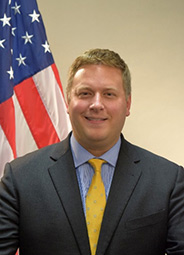
Following lunch, we heard from a panel which discussed congressional engagement, and how to talk so Members will listen. It was moderated by Luke Lindberg, director of global operations of Sanford Health from the South Dakota DEC, and featured: Angela Marshall-Hofmann, president of World Strategies, Inc. from the Arkansas DEC; Ernesto Grijalva, senior vice president of legal affairs for Latin America and the Caribbean for PriceSmart, Inc. from the San Diego and Imperial DEC; and John Saylor, director of the International Trade Group for Commonwealth Trading Partners, Inc. Suggestions for communication were discussed and welcomed by local export council members.
The final panel allowed DEC members to discuss their business assistance and mentorship programs. Moderated by Oz Erdem, NADEC vice chair and chair of the Central-North Florida DEC, the panel featured: Maureen Halstead, director of global product management for KaMin LLC and chair of the Georgia DEC; Rob Haak, CEO of Insight InterAsia from the Hawaii-Pacific DEC; and Nick Grooters, from Pacer Technology and the California Inland Empire DEC.
The NADEC forum ended with a round of “speed networking” where DEC members were able to connect with other members from across the United States.
The National Association of District Export Councils meetings next year will be held again in Washington, D.C., on May 20 and 21, 2019 and then again in October 2019.